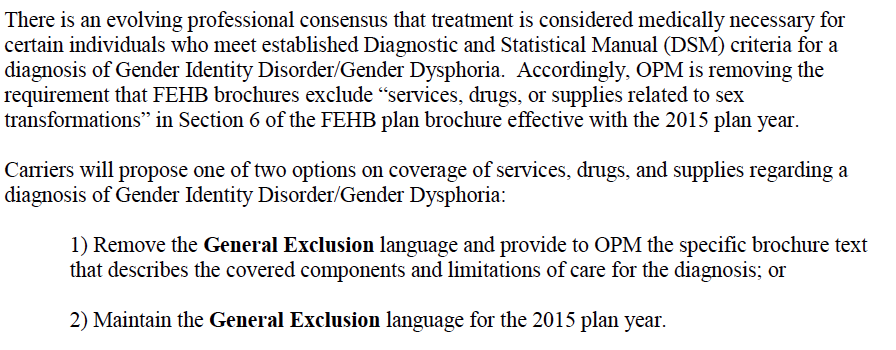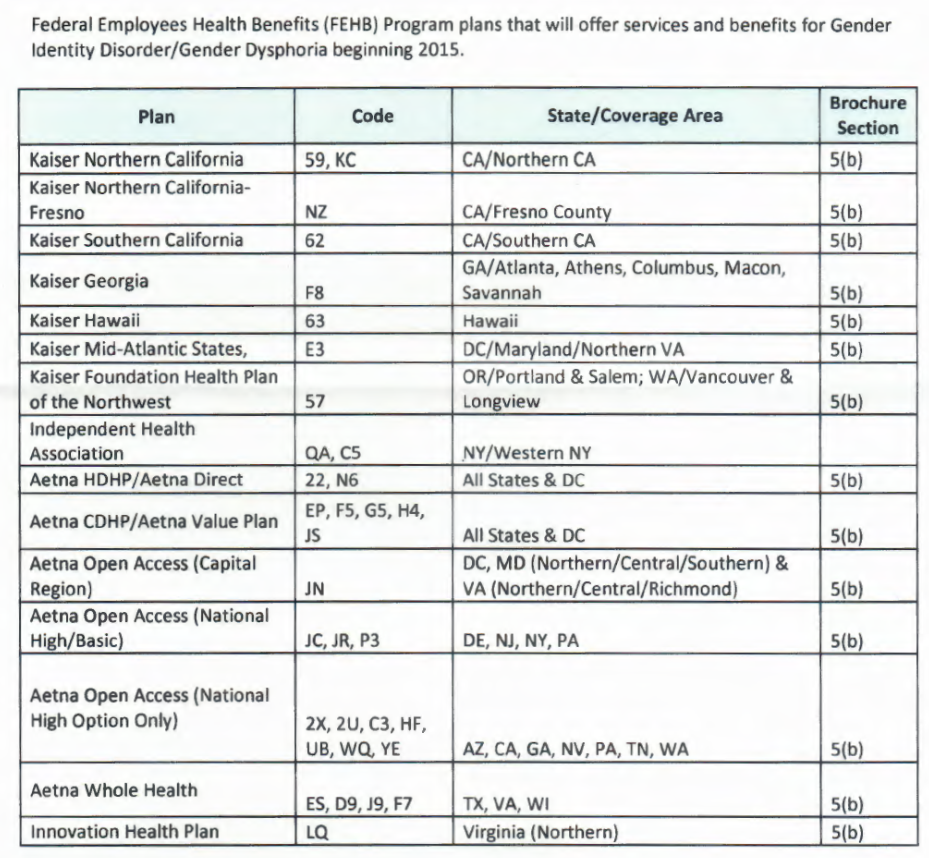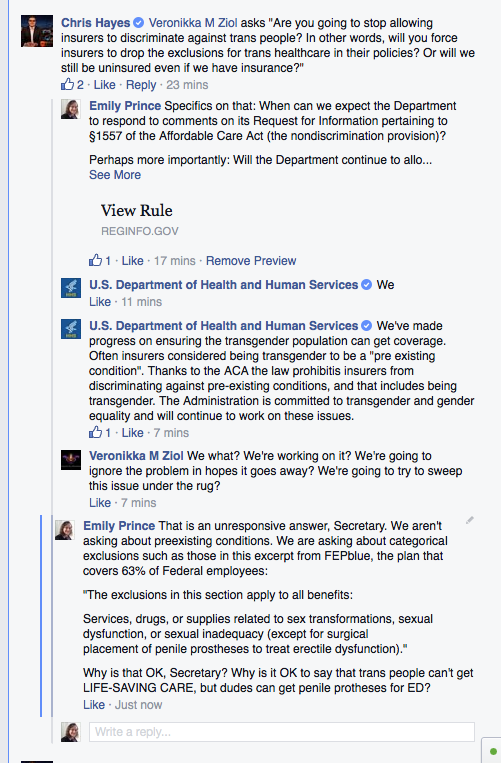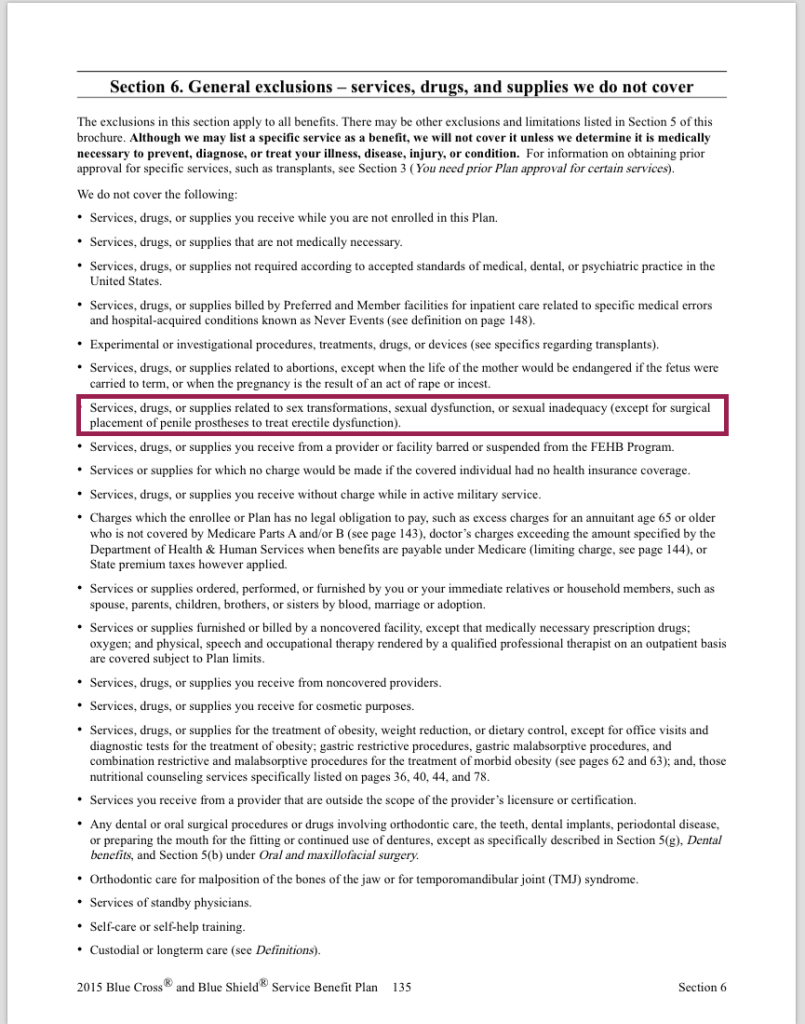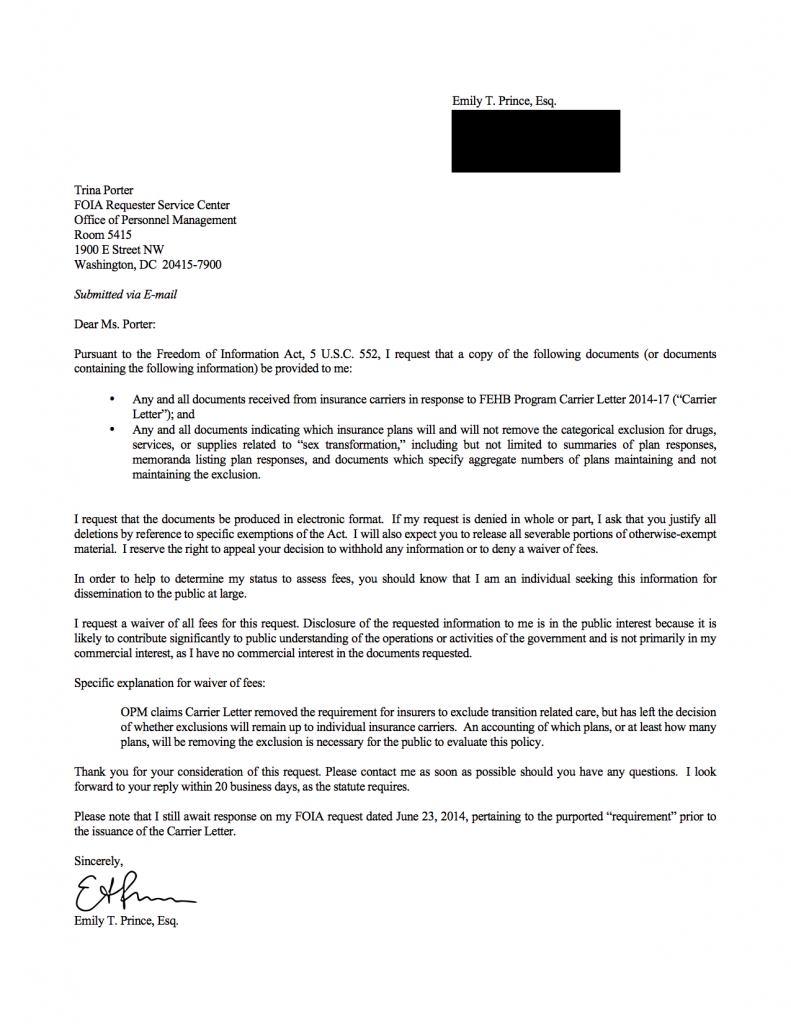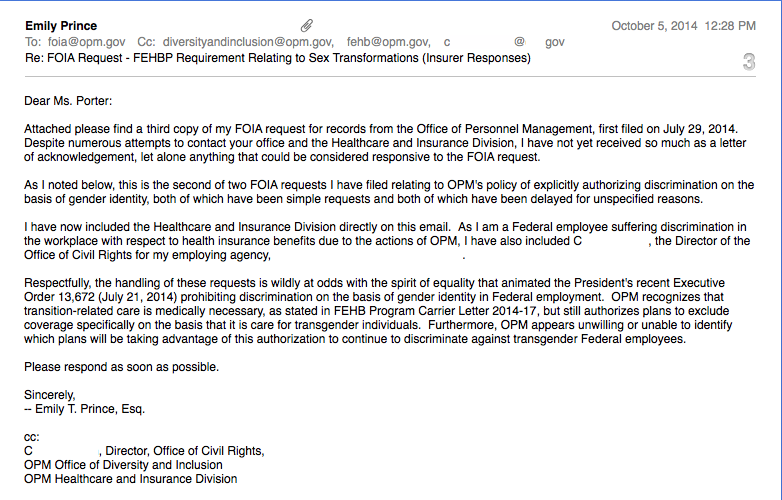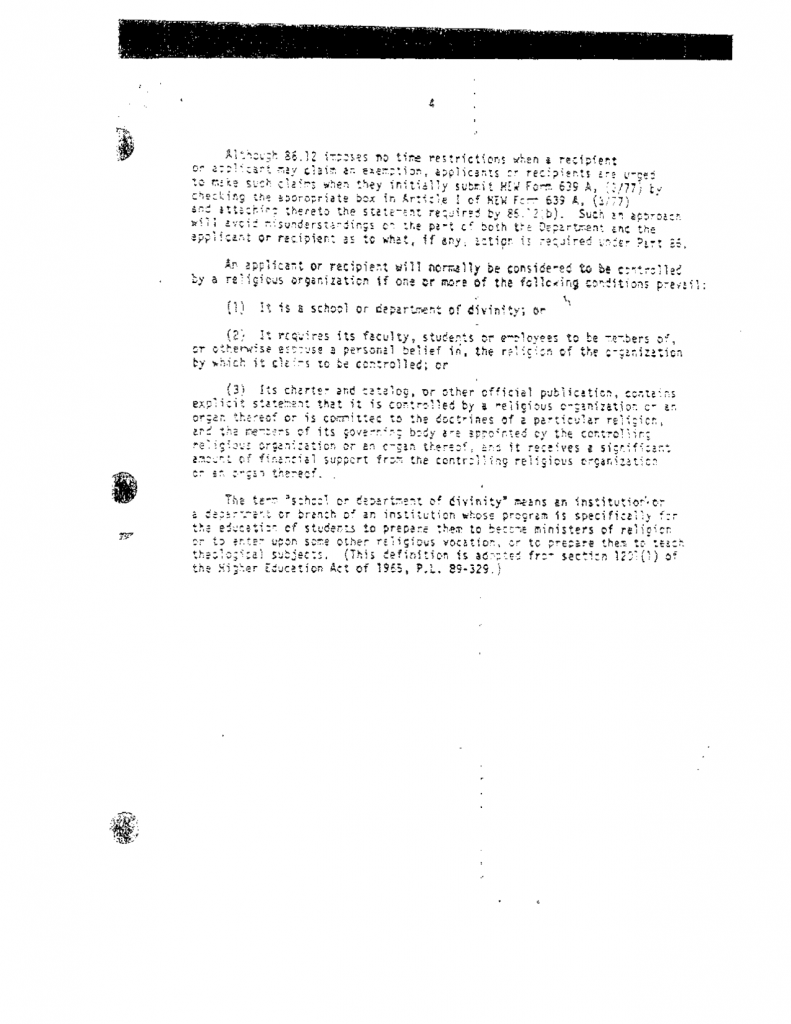The OIRA meeting record and handout are now available.
On Thursday, Kristin Beck, Mia Macy, and I met with officials from the Office of Information and Regulatory Affairs (OIRA), the White House Counsel’s office, the Domestic Policy Counsel, the Department of Health and Human Services (HHS), and the Department of Labor (Labor). The meeting concerned the implementation of the much-heralded July 21, 2014 Executive Order prohibiting discrimination on the basis of gender identity in Federal employment and prohibiting Federal contractors from discriminating on the basis of sexual orientation or gender identity. On October 20, 2014, Labor submitted their draft regulations implementing the Executive Order to the White House for approval prior to publication as a “final rule,” meaning there would be no opportunity for the public to comment. Kristin, Mia, and I took the opportunity to explain to the Administration that trans-exclusionary health plans are illegal, their elimination would be substantially beneficial for society, and would accomplish one of the Administration’s key policy aims. There is literally no legitimate basis for the Administration to fail to act to prohibit trans-exclusionary insurance policies offered by Federal contractors.
Unfortunately, the Administration has given transgender advocates plenty of cause for concern with the new regulation. In June of 2014, the Office of Personnel Management issued a letter to insurers participating in the Federal Employees Health Benefit Program, noting that transition-related care is medically necessary but nonetheless allowing insurers to discriminate against such care simply because it is for the benefit of trans people. Similarly, HHS’s first attempt to interpret the nondiscrimination provisions within the Affordable Care Act (ACA) rejected out of hand the idea that it required coverage of transition related care. The timing of the Executive Order itself also gave rise to concerns. For two years, reporters had been asking Labor for information on how it was enforcing an Equal Employment Opportunity Commission (EEOC) decision holding that discrimination on the basis of transition was discrimination on the basis of sex; the Administration response was to prohibit the most dogged reporter from public events in order to dodge questions.
Because there will likely not be an opportunity for public comment on the draft regulation, it was all the more important to make the case to the Administration through OIRA that it should prohibit transition-related care exclusions in Federal contractor health insurance plans. The arguments we presented ran along three themes: prohibiting trans-exclusionary health insurance plans is legally required; such a prohibition would deliver massive net societal benefits; and it’s in the publicly-articulated interests of the Administration. While I focused largely on the technocratic details, both Kristin and Mia did an absolutely phenomenal job in emphasizing the human element at play with these exclusions.
The legal case is blessedly simple. There is no real debate that transition-related care is medically necessary; the Administration has already admitted as much in the June 2014 OPM Carrier Letter, stating “there is an evolving professional consensus that treatment is considered medically necessary for certain individuals who meet established Diagnostic and Statistical Manual criteria for a diagnosis of Gender Identity Disorder / Gender Dysphoria.” The professional consensus is further demonstrated by the host of professional medical organizations issuing resolutions to that effect. In Macy v. Holder, the aforementioned EEOC decision (in which Mia Macy was the plaintiff), the EEOC clearly stated that discrimination against the act of transitioning was itself discrimination on the basis of sex. The trans-exclusionary language of health insurance plans clearly falls into this category. The language from Federal employee health insurance contracts is styled as prohibiting coverage for “services, drugs, or supplies related to sex transformations.” Other insurance plans are even more obvious, and have exclusions for “all services related to gender dysphoria or gender identity disorder.” Such exclusions are de jure discrimination against transition-related care; regardless of what other coverage is available, if the procedure to be covered is for the purpose of transition, the insurer refuses coverage. In addition to the Macy decision, there is also the nondiscrimination language of the Administration’s hallmark achievement, the ACA. 42 U.S.C. §18116, also referred to as §1557 of the ACA, prohibits discrimination on the basis of sex (including gender identity) in health programs or activities, including health insurance. As trans-exclusionary clauses in health insurance are discrimination on the basis of gender identity and therefore also discrimination on the basis of sex, they are illegal and the Administration should have no qualms about requiring Federal contractors to get rid of such clauses.
There are two sides to the economic case for removing trans-exclusionary insurance clauses. First, the actual costs of removing the clauses are negligible; second, the benefits of removing the clauses are high, due to the significant benefits that accrue to trans people becoming able to receive health insurance.
There is quite a bit of data to support the fact that removing exclusions for transition-related care poses no significant costs. When San Francisco broke new ground in implementing its coverage for transition-related care, the deal was struck in such a fashion that insurers were permitted to charge additional costs on top of general premiums in order to account for the benefit. While the additional costs charged initially were on the order of $1.70 per enrollee, insurers quickly discovered that this was a vast miscalculation. Despite having every interest in demonstrating high costs of covering transition-related care in order to justify maintaining the additional premium costs, insurers were unable to do so. Within several years of San Francisco’s removal of transgender exclusions, insurers could no longer justify any additional cost for covering transition-related care. When California evaluated its statewide mandate for trans-inclusionary health insurance policies, the state’s Department of Insurance issued an Economic Impact Assessment finding that “the aggregate cost to the state population as a whole will be very insignificant.” The Williams Institute found similar results when analyzing 34 employers who had implemented trans-inclusive health insurance policies. 85% of the sample reported no costs associated with the change in policy (such as an increase in premiums).
While the costs of providing trans-inclusive health insurance is low, due in large part to the low number of trans people in the general population, the costs of denying such coverage are high on an individual basis. The American Medical Association resolved that delays in treatment from financial barriers “can cause and/or aggravate additional serious and expensive health problems, such as stress-related physical illnesses, depression, and substance abuse problems.” Lack of access to transition-related care, combined with other economic discrimination against transgender people, pushes transgender people towards survival sex work to fund medically necessary care. Furthermore, the Williams Institute and the American Foundation for Suicide Prevention found an astounding prevalence of suicide attempts among the transgender community, 41%, vastly exceeding the national average of 4.6%. Inability to access medical care increased the likelihood of a suicide attempt by between 10 and 15 percentage points. If one must, as OIRA does, assign a numeric value to human life, the dramatic consequences for inability to access care lead one to the conclusion that the benefits far exceed the negligible costs. In terms of Federal benefit/cost analysis, the net societal benefits for such a policy will easily exceed $100 million, if not $1 billion. Numbers on that order of magnitude would normally all but compel the White House to act to achieve such benefits.
The White House has also made clear that inclusion of transgender people is a policy goal about which it would at least like to speak. The Administration frequently declares that discrimination on the basis of gender identity should be illegal, arguing that one shouldn’t be discriminated against at work because of “who you are.” Trans-exclusionary health policies are a particularly pernicious form of that kind of discrimination; it effectively bars transgender people from certain jobs or certain employers, or significantly reduces the amount they are paid purely because they are transgender.
Furthermore, the White House has declared that it will act where it has the power to do so and where Congress refuses to do so; that declaration led to the issuance of Executive Order 13,672, which required these regulations. Requiring Federal contractors to eliminate transition-related exclusions from their health insurance policies is entirely within the power of the Executive Branch, and Congress has refused time and again to pass the Employment Non-Discrimination Act as a way to deal with the issue.
Finally: the Administration is justifiably proud of the Affordable Care Act and how it has extended access to health insurance to millions of Americans. President Obama has been heard to proudly boast of eliminating discrimination based on gender and pre-existing conditions, and former Speaker Pelosi has often been heard to say that “being a woman is no longer a pre-existing condition.” Sadly, for transgender women, that’s simply not the case.
It is well past time for the Department of Labor to prohibit Federal Contractors from offering trans-exclusionary health insurance policies. If this regulation fails to do so, the Administration will discover that trans people will not be ignored.
Update: Also worth noting: the Human Resources Policy Association, an organization of “over 350 large and influential corporations” met with OIRA several days prior alongside IBM and Proctor & Gamble, both companies that HRC designates as having trans-inclusive health insurance, to discuss the rule. Their concerns appear to relate to potential affirmative action requirements in the Executive Order.
